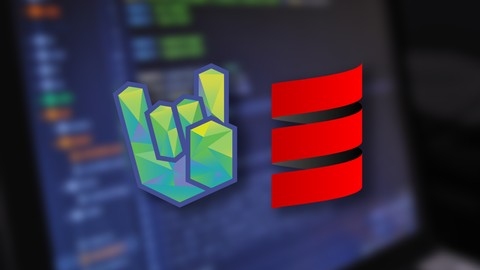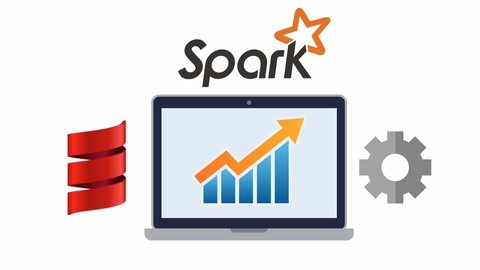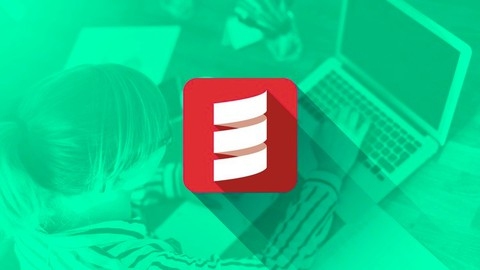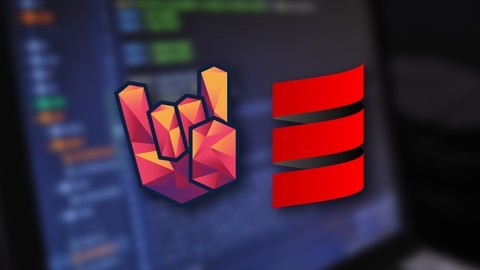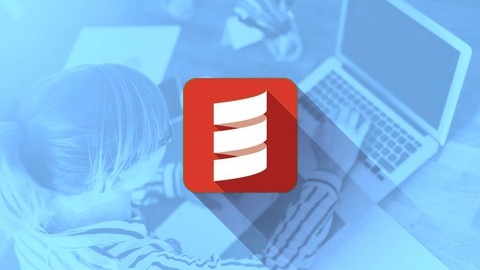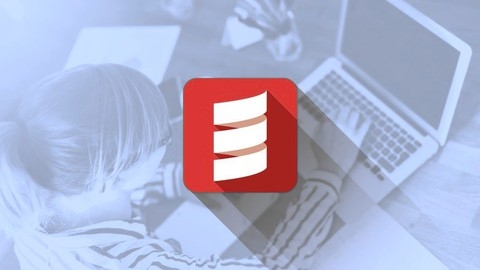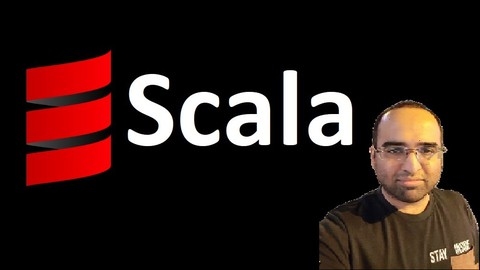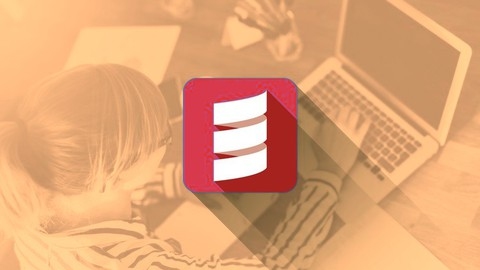If you’re looking for the best Scala courses on Udemy, you’ve come to the right place.
Scala is a powerful and versatile language that combines object-oriented and functional programming, making it a valuable skill for developers to learn.
In this blog post, we’ll explore some of the top-rated Scala courses on Udemy, helping you kickstart your journey into this exciting programming language.
Scala & Functional Programming Essentials | Rock the JVM
You will start with the absolute basics of Scala, covering values, variables, types, expressions, and functions.
The course dives deep into key Scala features like type inference, recursion, call-by-name, and call-by-value evaluation strategies.
Moving forward, you will explore object-oriented programming in Scala, including classes, objects, inheritance, traits, and generics.
The course provides hands-on exercises to solidify your understanding of these concepts by implementing your own collection data structure.
The course then shifts gears towards functional programming, introducing you to higher-order functions, curries, map, flatMap, filter, and for-comprehensions.
You will learn about Scala’s powerful collections library, including sequences like List, Array, and Vector, as well as Tuples and Maps.
Error handling is a crucial aspect covered through Options and Pattern Matching, enabling you to write robust and maintainable code.
The course even touches on advanced topics like Scala 3’s new features, such as enums and braceless syntax.
Throughout the journey, you will work on practical exercises, ensuring you gain hands-on experience with the concepts you learn.
Scala and Spark for Big Data and Machine Learning
This course starts with the fundamentals of Scala programming and gradually progressing to advanced concepts like machine learning with Spark.
You will begin by learning the basics of Scala, including arithmetic operations, variables, data types, control structures, and collections.
The course provides a solid foundation in Scala programming, ensuring you have a strong grasp of the language before moving on to more complex topics.
Once you’ve mastered the fundamentals, the course dives into Spark DataFrames, a powerful tool for working with structured and semi-structured data.
You’ll learn how to perform various operations on DataFrames, such as grouping, aggregating, handling missing data, and working with dates and timestamps.
The course then transitions into the exciting world of machine learning with Spark.
You’ll explore regression techniques, including linear regression, and learn how to implement them using Spark.
Additionally, you’ll delve into classification algorithms like logistic regression, which are essential for predictive modeling tasks.
But that’s not all – the course also covers model evaluation techniques, ensuring you understand how to assess the performance of your machine learning models.
You’ll gain insights into clustering algorithms like K-Means, which are useful for unsupervised learning tasks, and Principal Component Analysis (PCA), a dimensionality reduction technique.
Furthermore, the course introduces you to DataBricks, a powerful platform for working with Spark, and explores recommendation systems, a crucial aspect of modern data analysis.
You’ll even get hands-on experience with Zeppelin Notebooks on AWS Elastic MapReduce, providing you with practical skills in cloud computing and big data processing.
Throughout the course, you’ll have access to various exercises and projects, allowing you to apply what you’ve learned and solidify your understanding.
Scala Applied, Part 1
You will start by learning the basics of Scala, including the REPL, SBT, vals and vars, types, methods, if expressions, functional style, loops, and Scala scripts.
Next, you’ll dive deeper into Scala by working with IntelliJ and its worksheets, exploring method parameters and return types, expressions and statements, assignments and Unit, tuples, and collections like lists, sequences, sets, and maps.
You’ll also learn about mutable vs immutable data structures and how to work with files.
The course then covers classes and objects in Scala, including constructors, parameters, parametric fields, the Rational class, preconditions, self-referencing, infix style, symbolic methods, auxiliary constructors, companion objects, method overloading, and implicit conversions.
You will learn about control structures in Scala, such as expressions and statements, Unit and side effects, if expressions, ternary operators, try/catch/finally, while loops, for loops and expressions, match expressions and guards, and string interpolation.
Functions and closures are also covered, including private methods, nested methods, function literals, higher-order functions, placeholder syntax, partial application, closures, partial functions, var args, default and named parameters.
Finally, you’ll learn how to create custom control structures in Scala using generics, higher-order functions, currying, function arity, and by-name functions.
The course ends with a module on control abstraction.
Advanced Scala and Functional Programming | Rock the JVM
You’ll start by revisiting the basics, diving into dark syntax sugar and mastering advanced pattern matching techniques.
From there, you’ll explore the depths of functional programming with partial functions, enhancing functional collections like sets, and working with currying and lazy evaluation.
The course even guides you through building a potentially infinite set and stream using lazy evaluation.
Monads are demystified through hands-on exercises, preparing you for functional concurrent programming on the JVM.
You’ll learn about parallel programming, concurrency problems, thread communication patterns like producer-consumer, and mastering futures and promises.
Implicits and type classes take center stage, covering organizing implicits, pimp my library pattern, JSON serialization using type classes, and the magnet pattern.
You’ll even get a taste of Scala 3’s given instances and extension methods.
The type system is thoroughly explored, covering advanced inheritance, variance, type members, path-dependent types, self types, recursive types, F-bounded polymorphism, and higher-kinded types.
With practical exercises throughout, you’ll gain a deep understanding of these concepts.
Scala Applied, Part 2
This course covers a wide range of advanced Scala topics that will take your skills to the next level.
You’ll dive deep into composition and inheritance, exploring classes, abstract classes, anonymous classes, and the nuances of overriding.
The course also demystifies Scala’s type hierarchy, teaching you about top and bottom types, null and nothing, type inference tricks, and working with options.
Traits are a core concept in Scala, and you’ll learn how to create and use them, stack multiple traits, handle initialization, and leverage traits with type parameters.
The course guides you through packages and imports, covering visibility rules, namespace notation, package objects, and companion objects.
Crucially, you’ll gain hands-on experience with testing in Scala, including pre/post conditions, using ScalaTest for unit and integration testing, mocking with ScalaMock, property-based testing, and testing asynchronous code with futures.
Each module includes exercises to reinforce the concepts.
Throughout the course, you’ll work with real-world examples and domain models, ensuring you can apply what you learn to practical scenarios.
The course takes a direct, conversational approach, walking you through each topic step-by-step without unnecessary fluff or repetition.
Scala Applied, Part 3
The course starts with pattern matching, which is a powerful feature in Scala for deconstructing data structures.
You’ll learn how to use constant patterns, variable patterns, guards, and how to match on different data types like Options, Tuples, and Lists.
The course then dives into case classes, which are a convenient way to define immutable data structures in Scala.
You’ll learn how to use pattern matching with case classes and how to create compound pattern matches.
Next, you’ll explore Scala’s rich collection library, starting with immutable linked lists.
You’ll learn about the various operations you can perform on lists, such as initializing, converting, sorting, and higher-order functions like folds and predicates.
The course then expands its coverage to other collections like Sequences, Sets, and Maps.
You’ll learn about their performance characteristics, mutable vs. immutable implementations, and how to work with them effectively.
Moving on, you’ll dive into build tools like SBT, which is the de facto standard for building Scala projects.
You’ll learn how to set up SBT projects, manage dependencies, and create custom tasks.
Importantly, the course covers integrating Scala with Java, which is crucial for many real-world projects.
You’ll learn how to call Java code from Scala, handle nulls, convert between Scala and Java collections, and work with traits and interfaces.
Finally, the course covers Futures, which are a powerful abstraction for asynchronous programming in Scala.
You’ll learn how to create, compose, and work with Futures, as well as patterns like batching and retrying.
Throughout the course, you’ll find plenty of exercises to reinforce your understanding of the concepts covered.
Learn By Example: Scala
You will start by learning the basics of Scala, including how to install it and write simple programs like “Hello World”.
The course then dives into key concepts such as mutable and immutable variables, type inference, and string operations.
One of the core topics covered is the difference between expressions and statements in Scala.
You will learn how to use expressions in control structures like loops and conditionals, pattern matching, and nested scopes.
The course also covers functions in depth, including first-class functions, higher-order functions, anonymous functions, partially applied functions, and currying.
A significant portion of the course is dedicated to collections in Scala, such as tuples, lists, sets, and maps.
You will learn how to create and manipulate these collections, as well as how to use higher-order functions like map, flatMap, and filter.
The course also covers advanced collection operations like scan, fold, and reduce.
Object-oriented programming is another major focus area.
You will learn about classes, constructors, inheritance, abstract classes, anonymous classes, and traits.
The course also covers topics like type parameters, lazy values, operators, access modifiers, singleton objects, companion objects, case classes, and self types.
Throughout the course, you will work with numerous examples and exercises to reinforce your understanding of the concepts.
The course provides a solid foundation in Scala, preparing you for more advanced topics and real-world application development.
Beginning Scala Programming
This course starts with the basics, covering the language’s syntax, data types, control structures, and collections.
You’ll learn about important concepts like recursion, pattern matching, and higher-order functions through hands-on examples.
The course then dives into object-oriented programming in Scala, where you’ll build a text-based adventure game.
This project will teach you about classes, traits, inheritance, and other OOP principles.
You’ll also learn about advanced topics like implicit conversions, self-types, and linearization of trait methods.
Testing is an essential part of software development, and the course covers unit testing with JUnit and ScalaTest.
You’ll learn how to write and run tests for your Scala code.
Moving on, the course explores working with XML in Scala, including parsing and generating XML documents.
You’ll also learn about regular expressions and parser combinators, which are powerful tools for text processing.
Parallelism and concurrency are important topics in modern programming, and the course covers these concepts using Scala’s built-in support for parallel collections and the Akka actor model.
You’ll learn how to write concurrent and distributed applications using Akka actors, routers, and other features.
Throughout the course, you’ll work on practical examples and projects, including a text adventure game and an actor-based multi-user dungeon (MUD) game.
These projects will help you solidify your understanding of the concepts and techniques covered in the course.
Scala Programming In-Depth
You will start with the basics of Scala, including syntax, data types, and control structures.
The course then dives into more advanced concepts like functions, classes, objects, and constructors.
You will learn about important Scala features such as singleton objects, companion classes and objects, case classes, and pattern matching with regular expressions.
The course also covers implicit classes, conditional statements, loops, packages, and import statements.
Error handling is an important aspect covered through exceptional handling.
You will explore traits, value classes, and the universal trait, which are fundamental concepts in Scala.
The course dedicates multiple days to arrays and functional programming, ensuring you gain a deep understanding of these topics.
Collections are a crucial part of the curriculum, with dedicated sessions on lists, sets, maps, tuples, options, and iterators.
File handling is also covered, equipping you with the skills to work with files in Scala.
Throughout the course, you will gain hands-on experience with IntelliJ, a popular integrated development environment for Scala.
The course concludes with career guidance, providing insights into the data engineering career path.
Scala Advanced, Part 1 - The Scala Type System
This course provides a comprehensive exploration of the Scala type system and implicits.
You’ll start by setting up the necessary tools like the Java JDK, Scala, SBT, and IntelliJ IDEA.
The first module dives into properties and state in Scala, covering topics like mutable state.
Module 2 kicks off the in-depth study of the Scala type system, introducing generics, variance, and bounds.
Module 3 continues the type system journey, exploring type members and recursive types.
Module 4 covers advanced type system concepts like existential, structural, refinement, self, and infix types.
The course then shifts gears to implicits.
Module 5 lays the foundation, explaining implicit parameters and type classes.
Module 6 builds on this, covering implicit constraints and functions.
Throughout the modules, you’ll work through hands-on examples and exercises, solidifying your understanding of these crucial Scala concepts.
